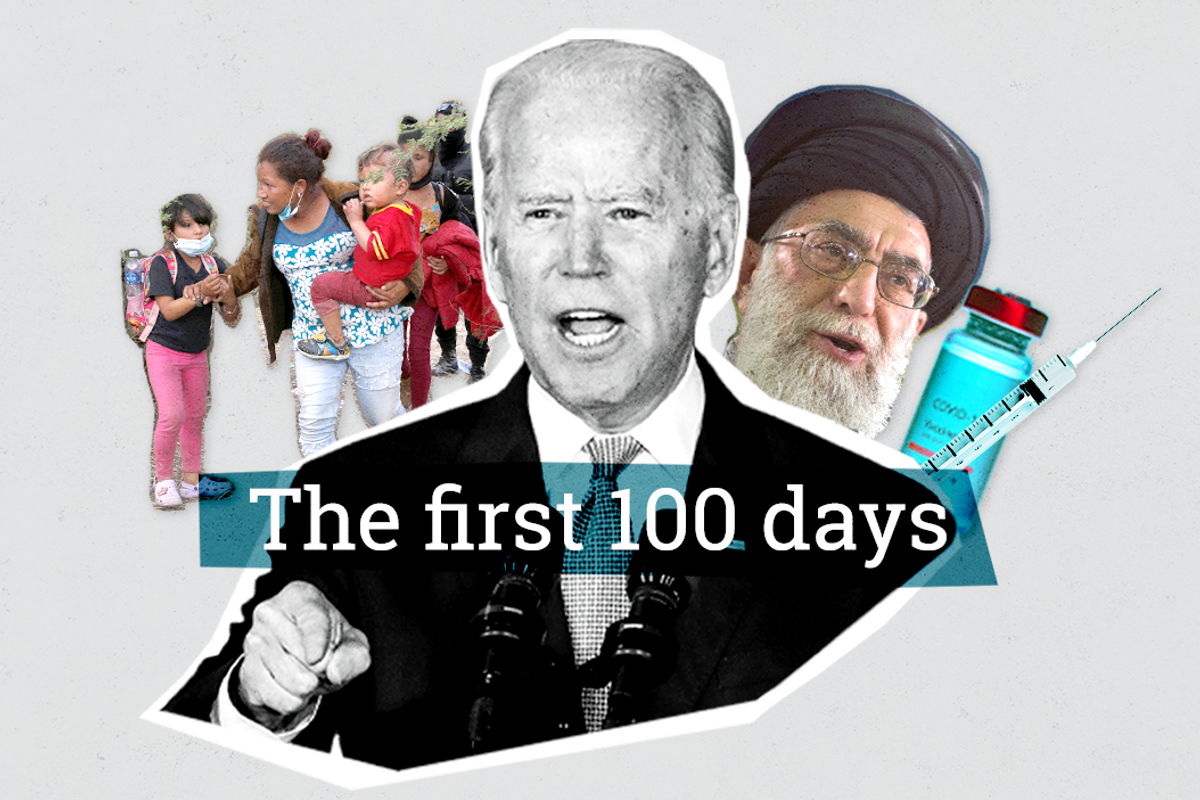On Wednesday, Joe Biden will become president because eighty-one million Americans, the highest tally in US history, voted to change course after four years of Donald Trump's leadership. Like all presidents, Biden and his vice president, Kamala Harris, take office with grand ambitions and high expectations, but rarely has a new administration taken power amid so much domestic upheaval and global uncertainty. And while Biden has pledged repeatedly to restore American "unity" across party lines — at a time of immense suffering, real achievements will matter a lot more than winged words.
Biden has a lot on his agenda, but within his first 100 days as president there are three key issues that we'll be watching closely for clues to how effectively he's able to advance their plans.
At home: the pandemic, naturally.
As the pandemic rages globally, Biden is taking office in one of the sickest nations on earth. Confirmed cases surpassed 24 million, roughly 4,000 Americans are dying of the virus daily, and the unemployment rate is nearly seven percent. It's no surprise that polls show 53 percent of Americans see tackling the virus as a top priority, with close to 70 percent saying the same about the pandemic-wracked economy.
The centerpiece of Biden's response plan is a proposed $1.9 trillion stimulus package that includes cash to help state and local governments manage the crisis and their finances, an additional $1,400 in direct assistance to low and middle income Americans, an extension of unemployment benefits, and funding for better COVID testing and vaccine rollout.
Biden needs to start with a bang, and congressional bargaining over this bill will test his ability to get things done with slim majorities in the House and Senate. Some Republicans and moderate Democrats are already balking at the price tag and targeting of the funds. The usual compromises will be made — on the size of the bill and its targeting — but if the haggling drags on while Americans suffer, Biden will pay a political price for it, affecting his ability to move the economic recovery legislation that he's teeing up for later this year, as well as to make good on his pledges to advance legislation on civil rights, guns, and immigration.
One simple benchmark to watch here: Biden has promised that 100 million vaccine doses will be administered by day 100 - that's between now and April 29.
Abroad: the clock ticks in Iran
Of all the foreign policy challenges that await Biden — rebuilding ties with European and Asian allies, finding the right balance of confrontation and cooperation with a rising China, and don't forget North Korea! — the most urgent test he'll face early on comes from Iran. Biden has signaled he wants to return the US to the 2015 nuclear deal, which Trump abandoned in 2018. But the clock is ticking. The Iranians — who have stopped abiding by the deal's limits on uranium enrichment since the US walked out — are now ramping up their production of bomb-ready material.
For another, Iran holds presidential elections this summer, and a hardliner who is less-inclined to negotiate with the West is likely to win. (The ultimate decision will remain with the Supreme Leader, but a hawkish new Iranian president can complicate the bargaining.) But rejoining any deal will be ultra-contentious on Capitol Hill, where many lawmakers of both parties want Iran to accept tighter constraints not only on its nuclear program but also its conventional war-making and regional meddling capabilities. Biden has argued that a more conventional, multilateral foreign policy can boost US interests in ways that Trump's impulsive unilateralism didn't. Iran will give him an early chance to prove it.
Immigration: a test approaches
Dramatically reducing the number of immigrants — both legal and illegal — was one of President Trump's signature, and most contentious, projects. Biden will immediately undo Trump orders that limited asylum opportunities or barred US entry from certain majority-Muslim nations, and he is teeing up a landmark immigration reform bill that would provide a path to citizenship for millions of undocumented immigrants already in the US.
But the issue could flare up well before that bill enters Congress if large groups of migrants force the issue at the southern border in the coming months. Over the weekend, Honduran police used tear gas and batons to turn around one such group, but others will form as people fleeing violence and poverty across Central America anticipate a better chance to reach the US now that Trump is gone. Mexico has already warned that Biden needs to address the issue squarely — after four years of Trump's often cruel and unusual policies along the Rio Grande, a fresh crisis at the border will force Biden to prove he can do things better and more humanely.

















